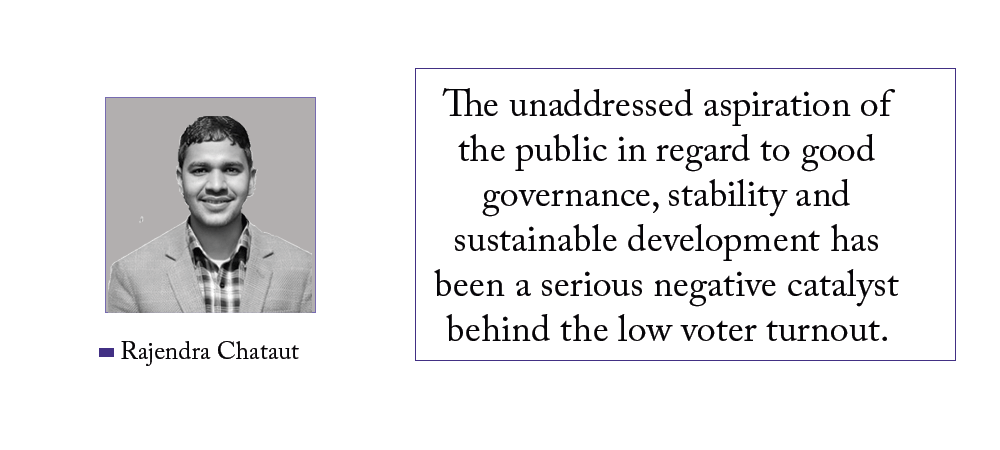- Friday, 20 February 2026
Low Voter Turnout Hints Public Resentment
Voter turnout is one of the crucial metrics of how citizens directly participate in the governance and decision-making process of their country. Higher voter turnout is in most cases a sign of the vitality of democracy, while lower turnout is usually associated with voter apathy and mistrust of the political process. Because of its importance, media and civil society actors, as well as the pro-democracy community and many other stakeholders are concerned when citizens do not turn out to vote. They are also keen to understand the reasons behind low turnouts
The country witnessed 61 per cent voter turnout in recent polls. This is significantly lower as compared to the two elections, with 77 per cent in 2013 and 78 per cent in 2017. This level of depreciation in turnout and voter non-participation hasn’t been raised as an issue so far to any public or political or bureaucratic stakeholders in Nepal. Over 22,000 polling centres were set up for the November 20 elections in which 5,907 candidates were in the fray. Altogether 2,76,000 personnel were deployed by the Election Commission (EC) itself apart from around 300,000 security forces for the polls. However, political parties and stakeholders couldn’t bring enough momentum to synergise voters to take part in polls.
India recorded the highest ever participation of voters in 2019 when it had 912 million eligible voters. Out of a total of 834,101,479 electors, 553,801,801 cast their vote in the general election 2014. There is a rise of approximate percentage despite major political and constitutional events. Even Pakistan witnessed 66.9 per cent turnout while Bangladesh saw 80.20 per cent voter turnout in the last general election. In 2020, Sri Lankan parliamentary election reported 71 per cent voter turnout amidst the COVID-19 crisis.
Factors
There are many reasons and factors contributing to the situation of low voter turnouts. This year, the EC imposed a stricter code of conduct. It basically shrank people’s constitutional right to freedom of expression. It was drafted with various impractical clauses as neither parties could follow them nor officials could check compliance but it confused most people and stakeholders. The election authority had an agreement with Meta Inc, the mother company of Facebook, to oversee breach of poll conduct in Facebook. The EC was tough against the ‘No, Not Again’, a campaign on social media. However, the Supreme Court came to rescue social media activists but it has surely demotivated the young participants and first time voters.
The unaddressed aspiration of the public in regard to good governance, stability and sustainable development has been a serious negative catalyst behind the low voter turnout. Political parties failed to make most of alliance politics. Duality and debate for and against the alliance based electoral participation made the situation worse. Top political forces kept on pushing the public out of their vested interest in power politics and this certainly increased dissatisfaction in Nepali commoners. The Nepali society is undergoing a major change in the orientation shift toward postmodernism from the concept of modernism with slight help of globalisation. The issue of survival is now no more of major concern as people are seeking comfort and convenience. Political parties might need to get back to people to know them better and perhaps it may generate better outcomes.
The Central Bureau Of Statistics (CBS) conducted a census in 2021 but it encapsulated or rather caused late publication of the major socio-demographic census data. This cost a good manifesto based on people’s social orientation for all parties. Maybe parties were too busy serving development agendas but most of them missed people’s agenda and spirit of the people's movement II. All data available on hands would have resulted in a better approach and thus better turnout.
It has been feared by most of the idealists of our country that we have shown tendency toward Schadenfreude syndrome. There was an interesting study carried out by researchers titled “Schadenfreude: Malicious Joy in Social Media Interactions” Front. It presented a model of Schadenfreude, pleasure at another’s misfortune, resulting in a typology of cases of this emotion. Four types are singled out: Compensation, identification, aversion, and injustice Schadenfreude. Even sentiment expressed post elections over social media highly suggest this syndrome as one of the contributing factors for toxicity resulting in low turnouts.
A remarkable degree of concern has been expressed about levels of voter turnout in established democracies, including the United States of America itself in recent decades. The paradox of voting is unsolved. It could be argued that parties are getting closer to each other ideologically in delivery and practice mechanism, therefore, reducing the benefits of electing one for government instead of another. This convergence is not at all welcomed by Nepalis.
Incentives
However, we are optimists and we should look ahead to seek this out. Socio-economic factors such as population size, stability and economic development should be considered first before planning any polls or any sort of participation in it by parties or individuals. Political factors such as closeness of elections, perception of the political issues at stake, campaign expenditures, and political fragmentation should be accessed and addressed by major stakeholders of power politics. Voting incentives or change in modality, update and adoption of e-voting and some regulatory provisions, among others, could generate higher turnouts. However, course correction is always an option to those who think they should as they reflect themselves with electoral results and this would be a very nice catalyst to increase voter turnout.
(The author is an independent researcher. rajendrachatauthq@gmail.com)















